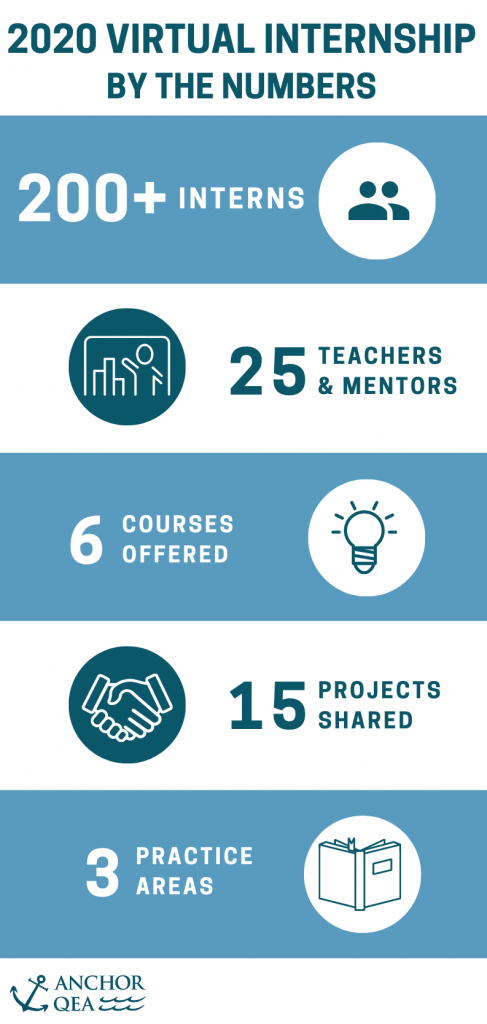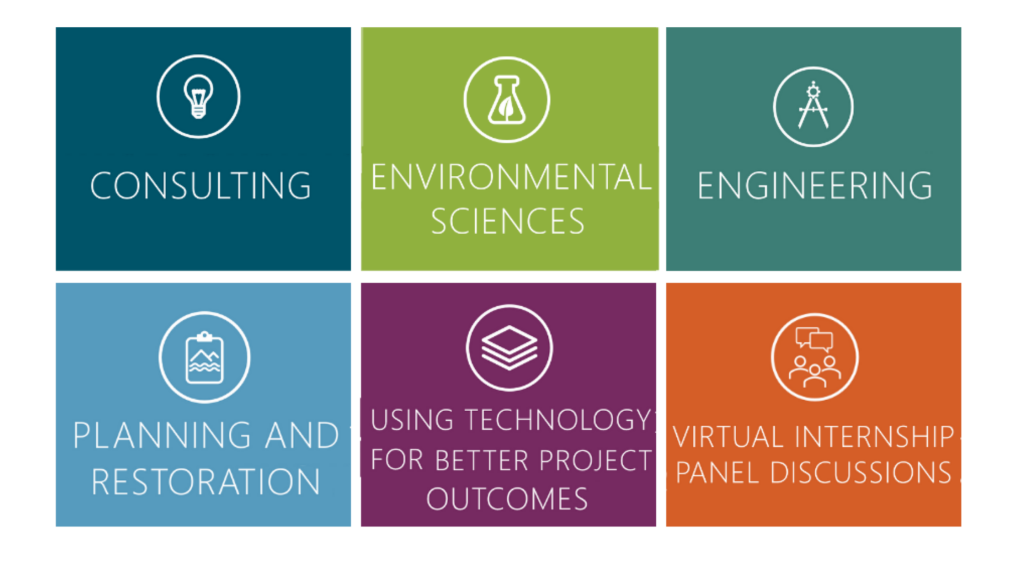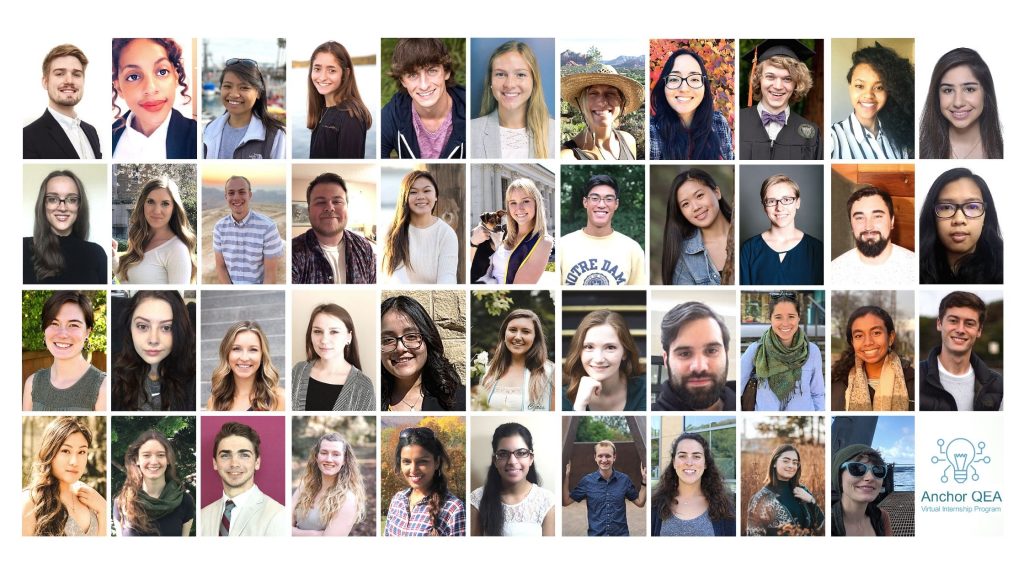Making the Best of a Virtual Situation: Reflections on Anchor QEA’s 2020 Internship Program

This week, Anchor QEA wrapped up our first ever Virtual Internship Program – an opportunity for socially distanced professional development and networking, during a time still impacted by a global pandemic.
Given the uncertainties related to COVID-19, Anchor QEA made the difficult decision this spring not to run our usual Summer Internship Program. But instead of canceling internships altogether, we modified our approach, allowing this critical piece of learning and career development to occur, albeit in a different format.
The Virtual Internship Program was a series of six online learning sessions presented over the course of three weeks, hosted by a collection of Anchor QEA’s senior leaders and supported by scientific and technical staff from across the company. Although virtual learning doesn’t replicate the experience of an on-site internship, we still wanted to offer professionals starting their careers the opportunity to learn and grow by exposing them to different aspects of real-world technical, engineering, and consulting situations.
In the past, approximately 10 summer interns would work in a handful of our offices to gain experience with projects in their area of technical or professional expertise. But with our Virtual Internship Program, we were able to extend the reach of a broad range of topics to a much larger audience than in-person internships would allow: approximately 200 interns, all from different backgrounds and geographical areas, attended the sessions.

While it was expected that the series would be a valuable learning experience for the interns, we were surprised by how much the presenters reported learning, as well. We asked the professionals who led the series to share what they learned from both the interns and the Virtual Internship experience overall.
The Art of Reflecting and Giving Advice
Internships are important because they provide real-world experience that helps students forge professional connections and build skills before heading into their chosen field. John Verduin, Anchor QEA’s Managing Partner, emphasized this point by sharing a little about his own exposure to consulting while in college—and how he believed the interns would find value in the program: “When I was in school, consulting was never a subject you learned—it was all about the technical aspects and not necessarily the business side—so it was fun reflecting on my whole career and figuring out what people would be most interested in learning.”
It turns out John wasn’t the only consultant with a love of teaching. Dr. Betsy Henry, Principal Scientist, also relished the chance to share her passion for environmental science. “When I was in college,” she recounted, “I had no idea what it actually meant to have a job [in the field], and felt this was a great chance for the interns to see what it entails to really be an environmental scientist.” Similarly, Rebecca Desrosiers, Principal Engineer, expressed how excited she was that the Anchor QEA team and the students came together for an enjoyable, synergetic experience. Rebecca felt that the whole situation has inspired Anchor QEA to come up with new ideas to connect with people: “This could be the new norm for us, proving that utilizing these new touchpoints in order to collaborate is key when educating the next generation.”
Kevin Russell, Principal and head of Anchor QEA’s Shared Technical Services, reported that the experience was “rewarding—to be able to interact with people that are entering their career and provide any advice I could.” He added, “There were things that this group saw that in-person interns wouldn’t have been able to see, giving them a better perspective of how the business works as a whole.” Traditional internships focus their participants’ efforts mostly in one service or practice area. But in the Virtual Internship Program, delving into multiple disciplines as the sessions progressed painted a more complete picture of the consulting field and Anchor QEA, providing the interns with a broad overview of the business that they wouldn’t otherwise have had.

The Power of Communicating Across Geographical Space
Internships are usually thought of as strictly hands-on experiences that require being physically present to reap their benefits. That perspective is changing, however, as virtual internships become an effective workaround for social distancing necessitated by COVID-19. Beyond the extreme circumstances of a pandemic, virtual internships are practical and inclusive. Unrestricted by geographic boundaries, students from all across the country can learn from any location and interact with each other and their instructors through online communication platforms.
John Verduin felt it was crucial for Anchor QEA to make the best of a hard situation by offering this virtual experience. He acknowledged that the changed format comes with trade-offs: you can’t see interns’ real-time reactions in an online session; however, he said, “The positive is you can connect with a lot more people at the same time from many different areas.” Likewise, Derek Koellmann, Principal Environmental Planner, appreciated that “even though Anchor QEA chose not to move forward with the in-person internships, it felt good to be able to offer something up that gave (the interns) an overview of what it would be like to work here.” Derek went on to note that while many firms simply canceled their internships, he was proud that “we made something available that was valuable and provided a good experience for people in an otherwise uncertain time.”

Thank you to everyone who participated in our 2020 Virtual Internship group photo!
Unlocking the Potential of Real-Time Data
The Virtual Internship Program was not only a great way to expand the interns’ knowledge, but also their experience with technology. Betsy Henry pointed out how even though she typically thrives on in-person interactions, the chat function brought a very interactive element to discussions. For example, “When a presenter asked the interns a question like What is your major?, within seconds, the presenter was able to scroll through and see answers in real-time,” Betsy said.
Kevin Russell also praised the chat function for adding another element to the series: “You were able to get insights about what people were interested in and see if they have any questions. Simultaneously, for the interns, we were able to (efficiently) provide information to them about what it’s like to work with us and the type of work we do.” Rebecca Desrosiers found the “questions asked by the interns throughout the session to be extremely insightful, and how it was very rewarding to see that they were really understanding the information.”
Derek Koellmann pointed out the learning curve of managing a session and interacting with each other via new technology was not a one-sided experience: “I definitely learned things about virtual communication software I didn’t know before—there were a number of new technological functions that I learned in a short time.” He also noticed how this experience allowed for greater diversity among attendees, remarking that “seeing people from across different regions of the country were well represented” showcased the success and positive impact of the program.
At the end of his interview, Derek offered a statement for all the interns who participated in the sessions (that it’s likely all the presenting speakers can agree with):
“While we’re in a difficult time, I really appreciate the fact that people took the time to participate in these different forums. If there’s an opportunity in the future when we can offer [in-person] internships, I hope that attendees will consider applying for those. We would really like to build on what we did for the Virtual Internship Program and still try to offer people those in-person opportunities as we move forward.”
Visit our Careers Page to learn more about Anchor QEA’s Internship Program or view open positions in our offices across the country.

ANCHOR QEA PROFESSIONALS FEATURED IN THIS ARTICLE:
John Verduin, Managing Partner
Betsy Henry, Principal Scientist & Environmental Sciences Practice Area Lead
Rebecca Gardner, Principal Engineer & Engineering Practice Area Lead
Derek Koellmann, Principal Environmental Planner & Planning and Restoration Practice Area Lead
Kevin Russell, Principal & Shared Technical Services Lead

